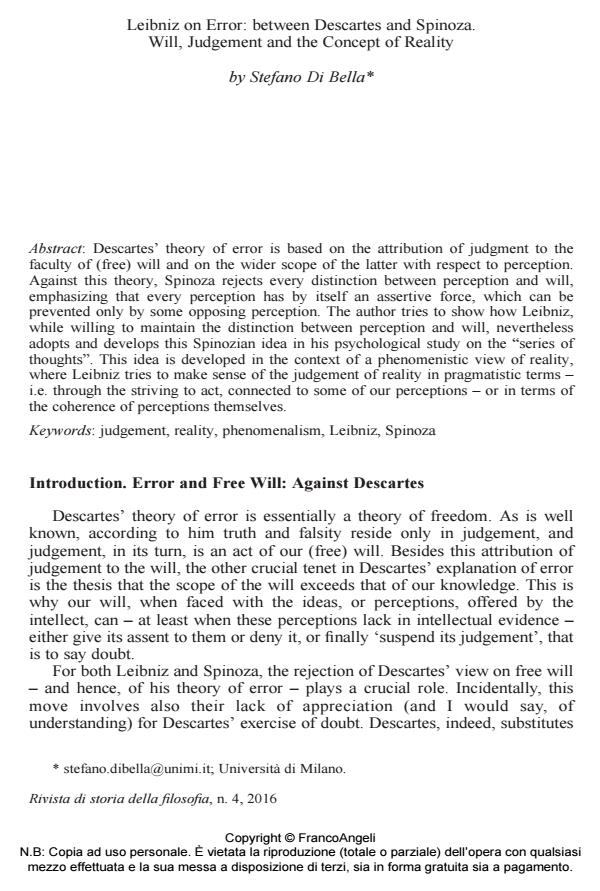Leibniz on Error: between Descartes and Spinoza. Will, Judgement and the Concept of Reality
Titolo Rivista RIVISTA DI STORIA DELLA FILOSOFIA
Autori/Curatori Stefano Di Bella
Anno di pubblicazione 2016 Fascicolo 2016/4
Lingua Inglese Numero pagine 13 P. 713-725 Dimensione file 47 KB
DOI 10.3280/SF2016-004010
Il DOI è il codice a barre della proprietà intellettuale: per saperne di più
clicca qui
Qui sotto puoi vedere in anteprima la prima pagina di questo articolo.
Se questo articolo ti interessa, lo puoi acquistare (e scaricare in formato pdf) seguendo le facili indicazioni per acquistare il download credit. Acquista Download Credits per scaricare questo Articolo in formato PDF

FrancoAngeli è membro della Publishers International Linking Association, Inc (PILA)associazione indipendente e non profit per facilitare (attraverso i servizi tecnologici implementati da CrossRef.org) l’accesso degli studiosi ai contenuti digitali nelle pubblicazioni professionali e scientifiche
Descartes’ theory of error is based on the attribution of judgment to the faculty of (free) will and on the wider scope of the latter with respect to perception. Against this theory, Spinoza rejects every distinction between perception and will, emphasizing that every perception has by itself an assertive force, which can be prevented only by some opposing perception. The author tries to show how Leibniz, while willing to maintain the distinction between perception and will, nevertheless adopts and develops this Spinozian idea in his psychological study on the "series of thoughts". This idea is developed in the context of a phenomenistic view of reality, where Leibniz tries to make sense of the judgement of reality in pragmatistic terms - i.e. through the striving to act, connected to some of our perceptions - or in terms of the coherence of perceptions themselves.
Parole chiave:Judgement, reality, phenomenalism, Leibniz, Spinoza
- A = Gottdfried Wilhelm Leibniz, Sämtliche Schriften und Briefe, Akademie-Ausgabe, Berlin, 1923 ss.
- GP = Id., Die philosophischen Schriften, hrsg. Carl I. Gerhardt. Berlin, 1875-1890.
- L = Id., Leibniz, Philosophical Papers and Letters. Transl. By Leroy E. Loemker. Chicago, 1956.
- LR = The Leibniz-Des Bosses Correspondence. Transl. by Brandon Look and Donald Rutherford. New Haven, Yale 2007.
- - Adams 1994: Robert Merrehw Adams, Leibniz. Determinist, Theist, Idealist, , Oxford University Press, Oxford-New York 1994.
- - Cristofolini 2008: Paolo Cristofolini, «Piccole chiose al testo dell’Ethica», in «Historia philosophica», 6, 2008. pp. 131-139.
- - Curley 1969: Edwin Moses Curley, Spinoza’s metaphysics. An Essay in Interpretation. Harvard University Press, Harvard 1969.
- - Garber 2009: Daniel Garber, Leibniz: Body, Substance, Monad, Oxford University Press, Oxford-New York 2009.
- James 1890: William James, The Principles of Psychology, Holt, New York, 1890.
- - Messeri 1992: Marco Messeri, I corpi e le menti. Saggio sull’epistemologia di Spinoza, Il Saggiatore, Milano 1992.
- - Spinoza 2014: B. Spinoza, Ethica, critical edition by P. Cristofolini, ETS, Pisa 2014.
- Technological Sustainability and Business Competitive Advantage Michael Fascia, Ellie Koseda, Bryan McIntosh, pp.315 (ISBN:978-3-031-35524-0)
Stefano Di Bella, Leibniz on Error: between Descartes and Spinoza. Will, Judgement and the Concept of Reality in "RIVISTA DI STORIA DELLA FILOSOFIA" 4/2016, pp 713-725, DOI: 10.3280/SF2016-004010